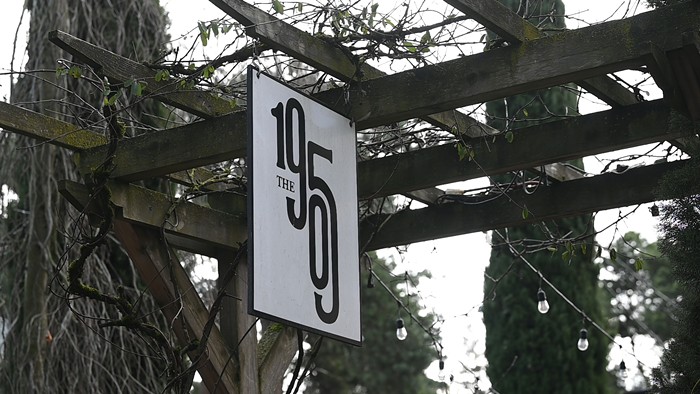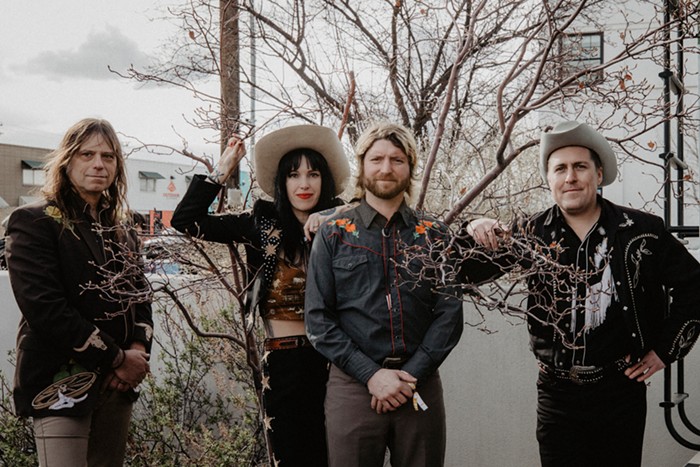ERIC CRESPO invites me into the workspace where he tinkers on the music he records and performs under the name Ghost to Falco. He describes it as a "glorified blanket fort," and that's not far off—it's tucked in the back half of his neighbor's garage, where they generously let him hang out for free. Crespo's lined the walls and ceiling with discarded cushions from church pews, and filled it up with assorted instruments and gear. There's a soft rain outside, and the hideout is cozy and meditatively quiet.
"I'm not really the kind of musician who plays in other people's bands," Crespo says. "I don't really know enough about music, truthfully, to have the chops to do it. I know how to write my own stuff. But being a 'musician' doesn't really interest me. Like, playing in a symphony, or playing covers—I don't care about that stuff at all. I kind of like just making up songs. That's where I get joy from music, from making up my own weird stuff."
Crespo has finished the fourth Ghost to Falco album, Soft Shield, which was recorded with a revolving door of friends and musicians at various high-end studios around Portland—the antithesis of the solitude found in his blanket fort. It was a long process, both the recording and mixing. "I would just throw money away in the end," he admits, "because I wouldn't be happy with it, and I wanted it to sound a certain way. I'm never going to make another record like that, that's for sure. I think I want to do the next one myself."
What Crespo's made with Soft Shield, though, is an album of startling invention and almost geologic beauty. Having begun Ghost to Falco as a loop-based one-man band, he's asked many musicians to join its ranks over the past decade or so. Soft Shield makes use of their talents, as Crespo's abstract but deliberate songs provide the intense, bright flame at the center. That's Aan's Bud Wilson playing drums; his Aan bandmate Reese Lawhon takes turns with Ohioan's Ryne Warner on bass, and other contributors include Heather Woods Broderick, Erik Clampitt, and Wooden Indian Burial Ground's Justin Fowler. (The current live lineup for Ghost to Falco includes Dana Valatka of AU on drums and Andrew Endres on bass; Soft Shield's release show this Friday will include a number of other guests as well.)
Ghost to Falco effectively began in 2001, when Crespo made the move from North Carolina to Portland. He'd played in bands before, but ultimately wanted to try something completely on his own. "About the time I'd decided to move, I went to see Unwound and Thrones," he says. "I'd never seen Thrones before, and I was like, 'Whoa, here's a guy doing a thing alone—oh shit!' I didn't know whether to be disappointed or excited. But then I thought, 'Maybe I'm on the right track.'
"I booked five shows moving from North Carolina to Portland, and those were the first five Ghost to Falco shows. I didn't know how it was going to go, so I didn't want to play a show where I actually lived—in case it was a complete failure, and then I wouldn't ever have to do it again. I could just be anonymous on the road."
Once in Portland, Crespo found a welcoming music community, and Ghost to Falco took many shapes over the years. For a while, Crespo avoided music with fixed rhythms altogether. "I felt like I totally destroyed that part of my ingrained nature, to want beats," he says. "Then at some point, I got into dub music, which is what brought me back to beats, oddly enough. Also, I had this van and it only had a radio; the tape player didn't work. And I remember listening to classic-rock radio, which I had never done. My girlfriend knew all these old songs, and I was like, 'What are these?!' I remember just really studying it," he says, mentioning Creedence Clearwater Revival and his housemates' Neil Young records specifically. "I was just trying to understand music that I had dismissed. And I like a lot of that stuff now."
While Ghost to Falco's music may have become more approachable over the years, Soft Shield remains a complicated album that isn't easily categorized. "High Treason" melds pedal steel and harmonies into a stunning sunrise, while "Born to Win" kicks around a dirty guitar line like an old tin can; "Feel the Glory" is a rubato hymn that evokes the aftermath of a storm: "Come feel the glory of the mess I've made," Crespo sings.
"They come from a subconscious place," Crespo says. "Not just lyrics, but the whole piece of music. The stuff I end up keeping has a certain element of mystery about it, something I can't easily place or trace back. It's something that has to be intriguing to me. If I come up with something too easily recognizable, I don't want to work on it anymore."
Crespo says that Soft Shield might be a reaction to the previous Ghost to Falco album, 2010's Exotic Believers, which was a rougher, angrier record that occasionally focused on the dark underside of rain clouds rather than the sunlight shining between them.
"With Exotic Believers, I was realizing how insane the whole culture of the world had become, or just realizing the extent of it, and how fucked everything was—on a really, really deep level. And just trying to come to grips with that: 'What am I supposed to do? Am I supposed to drop out of society completely?' I really was struggling with that kind of thing, and realizing that if I did, it would make me extremely unhappy. Soft Shield is the reaction to that—like, 'Okay, I'm just going to make a go of it.' It's licking your wounds a little bit, to some degree."
More than an excellent summation of where Ghost to Falco's at right now, the album's a statement of individuality in an increasingly globalized, homogenized culture. Crespo points to the rise of licensing for perpetuating "a bland cycle of terribleness" in the current music scene, but also recognizes that he's mellowed a bit over the years. "I used to think of playing shows as almost trying to educate people, or challenge people. And I'm not so interested in that anymore."
And Soft Shield is a record that operates deeply beneath the surface, where Crespo's subconscious turns into music and sound. "The project has always been about trying to deal with the sort of things where I have no other place to deal with them," he says. "You can't really discuss this stuff in polite company, you know what I mean? But some part of my brain is forced to think about these things, so I have to do something with it. That's why I'm not so interested in just being a musician who jams with people—that's not what this is about for me. It's about trying to work shit out."



















